Ghost of Europe past
John Morgan
Uzes, Gard For everything under the sun — and here in the First Duchy of France the temperature is in the eighties — there is an ideological explanation. Consider a traffic jam. Just to break the conversational ground with a communist activist, I said how impressed I was with his compatriots' behaviour in the long traffic hold-ups which had certainly depressed me in Nimes, Orange and Avignon. No car moving yet none of that old bad temper, swearing, blowing of horns, fighting traditionally associated with French motorists. Indeed, he replied: but I must understand that the behaviour of French motorists in the past was based not on national character but on the pattern of car ownership. When the car belonged to an elite, then disagreeable manifestations occurred. Now that, in spite of the reactionary policies of the government, car ownership was general among the masses, we could see how they felt inspired by a sense of community. They belonged one to another and so were patient and understanding. I thought of pointing out that this was a cheerless and fume-laden paradigm, but let it pass.
We called at the three-day-long fete on the banks of the Rhone at Avignon organised by the communist newspaper La Marseillaise, a pre-election wing-ding across the water from the massive Pope's Palace. All week the paper had been ripe. with invective between the parties of the left. So, I asked, did my friend not feel here in touch with the historic European spirit, with that monument to papal dissension across the way, what with him having his pope Marchais, the socialists their Mitterrand? He was offended. Was I suggesting that Marchais was the pope of Moscow? This was typical socialist propaganda. The quarrels of antiquity had nothing to do with the present state of the Gard. Such metaphors were frivolous.
Later, walking together from the Clock Square at the back of the Papal Palace where delegates to yet another conference were stamping and cheering in the heat, another emblem of antiquity irritated him. The town walls were rich in rival posters. To match the huge, glamorous portraits of Madame Simone Veil (`they call her "Merveil" — mother and marvellous') the communists had a pretty girl depicted flinging open shutters, no doubt contemplating a new dawn rather than fleeing from a disagreeable lover. The latter's slogans spoke of work, liberty, the independence of France. And over them all, to my friend's rage, local linguistic patriots in that patois which even Racine declared he found incomprehensible: Prouvenco Dau! Parlaren. Aoara nosto lengo, defrndre nosto dignita. But, I put it, were they not exhibiting preciselV that kind of local feeling that was at the heart equally of the communist appeal? His reply was lost because, as we walked into the narrow Rue du Gal under the great walls, there came from an apparently emPtY 18th-century house the sound of a tenor aria from Mozart's ldomeneo. We listened.
We called out but no one answered. The house was being restored. All the doors were locked. The performance continued.
Even more mysteriously, the recording was of the distinctive old Glyndebourne Idomeneo. No mason replied and we drove puzzled back into the countryside. The ghost of Europe past was everywhere. Even my hard-headed friend admitted to being moved by this strange incident. But he simply would not have it that the ghost had anything to do with the surprising strength of the communists in this territory.
That the closure of the big steelworks down the road in Marseilles should create support there was natural enough. But why here 10 the cherry-rich and strawberry-heavY fields? A Giscardian who had, to coin 3 phrase, taken the Veil, a man who had just bought a hamlet near here, offered me a glib but, I think, inadequate explanation. It was all due to the mines at neighbouring Arles long ago. A communist was elected and from that first power grew the contracts and the job that went with contracts and the votes that went with both.
As if offering the conclusive illumination, this property owner took me to the lovely baroque square here presently being very slowly restored. Tiles lay in untidy heaps. A group of workers were staring at than in heat rendered hotter by the square's white ness. The previous contractors had abandoned the job. Could I not see, said MY guide, with that sanctimoniousness peculiar to the bourgeoisie of all nations when contemplating builders at work, that no one was doing a hand's turn? (To be fair the comrade had also been sheepish about this affair, but he blamed the socialists). No doubt Clement VI had felt much the same contemplating his masons.
Routine cynicism of this kind does not exorcise ghosts. More to the point was the scorn of townspeople talking about the 5,000 tiny houses being built in the hills selling at £25,000 each, all of which were being bought as second homes by Dutch people. Some European spirit, huh? But when they spat about Parisians buying houses, then the matter was exposed. This was what the communist vote was about. All the tourists and traffic do not change the mediaeval vote. Local pride is so deep that when a dreadful murder was committed here recently — a schoolboy hanged, emas; culated, dressed in girl's clothing — the local newspaper would not even report it. Sun' light does not illuminate the spirit. Not s°,. much 'Europe des Patries', but Europe °1 the small town.










































 Previous page
Previous page